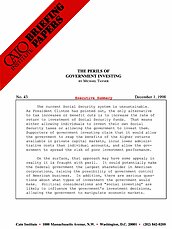The current Social Security system is unsustainable. As President Clinton has pointed out, the only alternative to tax increases or benefit cuts is to increase the rate of return to investment of Social Security funds. That means either allowing individuals to invest their own Social Security taxes or allowing the government to invest them. Supporters of government investing claim that it would allow the government to reap the benefits of the higher returns available in private capital markets, incur lower administrative costs than individual accounts, and allow the government to spread the risk of poor investment performance.
On the surface, that approach may have some appeal; in reality it is fraught with peril. It could potentially make the federal government the largest shareholder in American corporations, raising the possibility of government control of American business. In addition, there are serious questions about what types of investment the government would make. Political considerations and “social investing” are likely to influence the government’s investment decisions, allowing the government to manipulate economic markets.

This work is licensed under a Creative Commons Attribution-NonCommercial-ShareAlike 4.0 International License.

